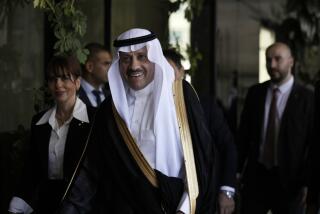Migration to Riyadh : Saudis Plan New Suburb for Envoys
- Share via
RIYADH, Saudi Arabia — Over the next few months, an extraordinary migration will be taking place from Jidda, on the Red Sea, to a dust bowl sprouting a forest of construction cranes on the western outskirts of Riyadh.
The Saudi government has served notice on the 8,000 foreign diplomats and their dependents living in Jidda that they have until September to move their embassies to Riyadh, 600 miles away.
Riyadh has been the official Saudi capital for more than 30 years, but strict limits were placed on outsiders in the traditional home of the Saudi Royal Family, where wristwatches and bicycles were prohibited as foreign vices only a generation ago and foreign airlines were until recently banned from landing.
Peephole on World
The strictures kept both the diplomatic corps, which like everything else here ballooned with the oil boom, and the Saudi Foreign Ministry well isolated in Jidda, a seaport that historically has served as the kingdom’s peephole on the world.
In 1975, however, the government decided to move the Foreign Ministry to Riyadh, where the other ministries are located, and the diplomats were told to pack up as well. The result seemed quintessentially Saudi: a posh, 200-acre diplomatic quarter is under construction, and despite its lavish amenities, it has already managed to evoke a degree of controversy among its prospective residents.
It is not just that the Iraqi ambassador’s backyard adjoins that of his nation’s mortal enemy, the Iranian envoy. Many world capitals have an area favored by diplomats, and some governments, notably the Chinese and the Soviets, impose strict limits on where diplomats may live, but it is unusual to have a self-contained city where all the diplomats are under orders from the host government to live and work.
‘No Need to Leave’
“It will probably be more difficult and less satisfying to live out there than in Jidda,” one Western diplomat said. “There will be no need to leave the quarter except to get into your limousine to visit the Saudi Foreign Ministry.”
Saudi officials are trying to dispel the notion that the government hopes to isolate foreigners from Riyadh’s ultra-conservative Islamic society (most women still wear the veil) by building the quarter a good 15-minute drive from the center of the city. For one thing, the Saudis have made plans for 20,000 Saudis and non-diplomatic foreigners to move into the area.
“We’re not building a ghetto; this is an open community,” said Ahmed Salloum, who is supervising construction of the quarter for the Riyadh Development Authority.
Land Prices Boom
Salloum said the diplomatic quarter had been conceived as a way to ease the move to Riyadh, where real estate speculation has made land 10 times more expensive than the newly developed acreage the government is selling.
The Saudis are spending money lavishly to make the complex comfortable--building roads, a 14-building international school complex and a diplomatic club, as well as a huge sports facility that will be open to the public and shopping centers that will be developed privately.
Each government is responsible for designing and building its own embassy; sites were determined by lottery. An enormous U.S. Embassy complex, the largest in the quarter at six acres, is about half completed. It will cost about $27 million.
“So far, it’s a lot of fun,” said Guy Ducrey, the Swiss ambassador, who moved in last January as the quarter’s second tenant (South Korea was first).
Jidda’s Climate Preferred
Ducrey is one of a number of envoys who say they prefer Riyadh’s climate to Jidda’s. Riyadh may be the hottest capital in the world--summertime temperatures hover around 115 degrees--but it lacks Jidda’s humidity, which the British adventurer T. E. Lawrence once likened to being “hit in the head with a shovel.”
A number of diplomats said they are withholding judgment on the new quarter until they hear from the Saudis about how much freedom they will have in the new community.
For example, foreign women are allowed to drive in the Aramco oil compound in Dhahran, something forbidden elsewhere in the kingdom, and some diplomats are hoping that a similar relaxation will apply in the diplomatic quarter, where most diplomats will live some distance from their embassies.
“We just don’t know to what extent Saudi law is going to apply,” one concerned diplomat said. “Will men and women be allowed to play tennis together? Will the school be segregated by sex? So far, we just don’t know.”
The Development Authority’s Salloum says that decisions on such questions are a matter for the Foreign Ministry to decide. But as a rule, he said, “the regulations applied outside will be applied inside,” and added: “There will be no difference inside the Diplomatic Quarter from the rest of the kingdom.”
More to Read
Sign up for Essential California
The most important California stories and recommendations in your inbox every morning.
You may occasionally receive promotional content from the Los Angeles Times.










